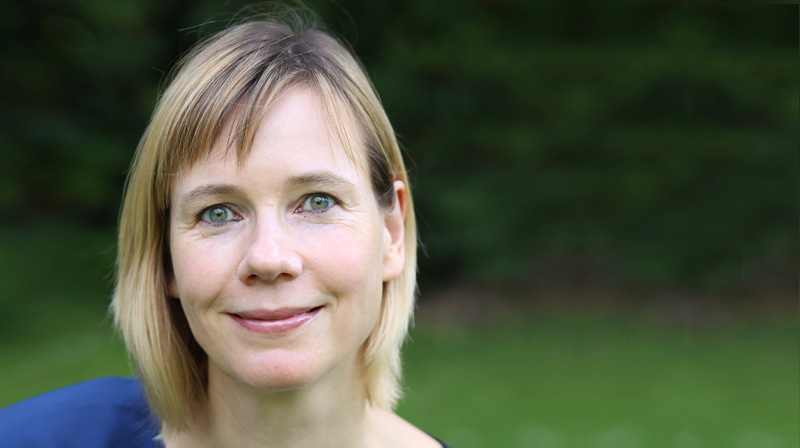Katja Garloff
Katja Garloff
Employment
2013-present Professor of German and Humanities, Reed College
2009 Visiting Associate Professor of German, Harvard University
2003-2012 Associate Professor of German and Humanities, Reed College
1997-2003 Assistant Professor of German and Humanities, Reed College
Education
1992-97 University of Chicago Ph.D., Germanic Studies, December 1997
1984-91 University of Hamburg M.A., German Literature (Minors: History, Sinology), September 1992
Publications
Authored Books
Making German Jewish Literature Anew: Authorship, Memory, and Place. Bloomington, IN: Indiana University Press, 2022 (forthcoming).
Mixed Feelings: Tropes of Love in German Jewish Culture. Ithaca, NY: Cornell University Press, 2016.
Reviewed in German Quarterly (2017); German Studies Review (2018); Modern Language Review (2018); Arbitrium (2019); Association for Jewish Studies Review (2019); Monatshefte (2020)
Words from Abroad: Trauma and Displacement in Postwar German Jewish Writers. Detroit, MI: Wayne State University Press, 2005.
Reviewed in German Studies Review (2007); Monatshefte (2007); Pacific Coast Philology (2007); Modern Language Review (2007)
Edited Book
German Jewish Literature after 1990, ed. Katja Garloff and Agnes Mueller. Rochester, NY: Camden House, 2018.
Reviewed in Choice (2019); German Quarterly (2019); Germanistik (2019); Modern Language Review (2020)
Articles and Book Chapters
“Transcultural Empathy.” In Routledge Companion to Literature and Trauma, ed. Colin Davis and Hanna Meretoja, 211-219. New York: Routledge, 2020.
“Diasporic Place-Making in Barbara Honigmann.” In Rebuilding Jewish Life in Germany, ed. Jay Geller and Michael Meng, 166-180. New Brunswick, NJ: Rutgers University Press, 2020.
“What is a German Jewish Author? Authorial Self-Fashioning in Maxim Biller, Esther Dischereit, and Barbara Honigmann.” In German Jewish Literature after 1990, ed. Katja Garloff and Agnes Mueller, 19-37. Rochester, NY: Camden House, 2018.
“Introduction” (co-written with Agnes Mueller). In German Jewish Literature after 1990, ed. Katja Garloff and Agnes Mueller, 1-16. Rochester, NY: Camden House, 2018.
“Judaism and Zionism.” In Kafka in Context, ed. Carolin Duttlinger, 208-215. New York: Cambridge University Press, 2017.
“Arthur Schnitzler.” In Routledge Encyclopedia of Modernism. Ed. Stephen Ross. London: Routledge, Taylor & Francis Group. https://www.rem.routledge.com/articles/schnitzler-arthur-1862-1931.
“The Power of Paratext: Jewish Authorship and Testimonial Authority in Benjamin Stein’s Die Leinwand.” In Crossing the Disciplinary Divide: Conjunctions in German and Holocaust Studies, ed. Jennifer Kapczynski and Erin McGlothlin, 141-155. Rochester, NY: Camden House, 2016.
“Interreligious Love in Contemporary German Film and Literature.” In Judaism, Christianity, and Islam: Collaboration and Conflict in the Age of Diaspora, ed. Sander Gilman, 153-164. Hong Kong: University of Hong Kong Press, 2014.
“Poetic Sideshadowing: Paul Celan’s ‘Eine Gauner- und Ganovenweise” (in Polish). In Kartki Celana [Celan’s Pages], ed. Johanna Roszak, 45-63. Cracow: Austeria, 2012.
“Unrequited Love: On the Rhetoric of a Trope from Moritz Goldstein to Hannah Arendt.” Nexus: Essays in German Jewish Studies 1 (2011): 47-65.
“Kafka’s Racial Melancholy.” In Kafka for the Twentieth-First Century, ed. Stanley Corngold and Ruth Gross, 89-104. New York: Camden House, 2011.
“Figures of Love in Romantic Antisemitism.” The German Quarterly 80.4 (2007): 427-448.
“Kafka’s Crypt: W.G. Sebald and the Melancholy of Modern German Jewish Culture.” Germanic Review 82.2 (2007): 123-140.
“The Task of the Narrator: Moments of Symbolic Investiture in W.G. Sebald’s Austerlitz.” In W. G. Sebald: History – Memory – Trauma, ed. Scott Denham and Mark R. McCulloh, 155-167. New York: De Gruyter, 2006.
“Expanding the Canon of Holocaust Literature: Traumatic Address in Hubert Fichte and Wolfgang Hildesheimer.” New German Critique 96 (2005): 45-74.
“Femininity and Assimilatory Desire in Joseph Roth.” Modern Fiction Studies 51.2 (2005): 354-373.
“Sublimation and Its Discontents: Christian-Jewish Love in Lessing’s Nathan der Weise.” Lessing Yearbook 36 (2004-2005): 51-68.
“The Emigrant as Witness: W.G. Sebald’s Die Ausgewanderten.” The German Quarterly 77.1 (2004): 76-93.
“Essay, Exile, Efficacy: Adorno’s Literary Criticism.” Monatshefte 94.1 (2002): 80-95.
“Cosmopolitan Leftovers and Experimental Prose: Peter Weiss’s Das Gespräch der drei Gehenden.” In Rethinking Peter Weiss, ed. Jost Hermand and Marc Silberman, 1-19. New York: Peter Lang, 2000.
“Peter Weiss’s Entry into the German Public Sphere: On Diaspora, Language, and the Uses of Distance.” Colloquia Germanica 30.1 (1997): 47-70. Reprinted in Twentieth Century Literary Criticism 152 (2004).
“‘Schimmern, glitzern, blöden. träumen, eilen und stolpern’: Robert Walser’s Theatrical Cities.” Germanic Review 72.1 (1997): 35-49.
Awards, Honors, Grants
2018-19 American Council of Learned Societies Fellowship
2018 DAAD (German Academic Exchange Service) Research Fellowship
2012-13 Sabbatical Award Fellowship, Reed College
2008 (fall) Visiting Scholar, Columbia University
2006-2007 Millicent C. McIntosh Fellowship, Woodrow Wilson Foundation (renamed: Institute for Citizens and Scholars)
2006 (spring) Competitive Paid Leave Award, Reed College
2003 Mellon Faculty Seminar Grant (Theme: Masculinities), Reed College
2000, 2006 Levine Research Grant, Reed College
2000 (fall) Competitive Paid Leave Award, Reed College
1999-2020 Stillman Drake Grant, Reed College (multiple years)
1999 Charles E. Culpeper Foundation Grant, Reed College
1998-2020 Dean’s Summer Research Grant, Reed College (multiple years)
1997 Ph.D. thesis defended with honors, University of Chicago
1995 Stuart Tave Teaching Fellowship, University of Chicago
1992-96 Goethe Graduate Fellowship, University of Chicago
Contact
Katja Garloff, Department of German, Reed College, garloffk@reed.edu

